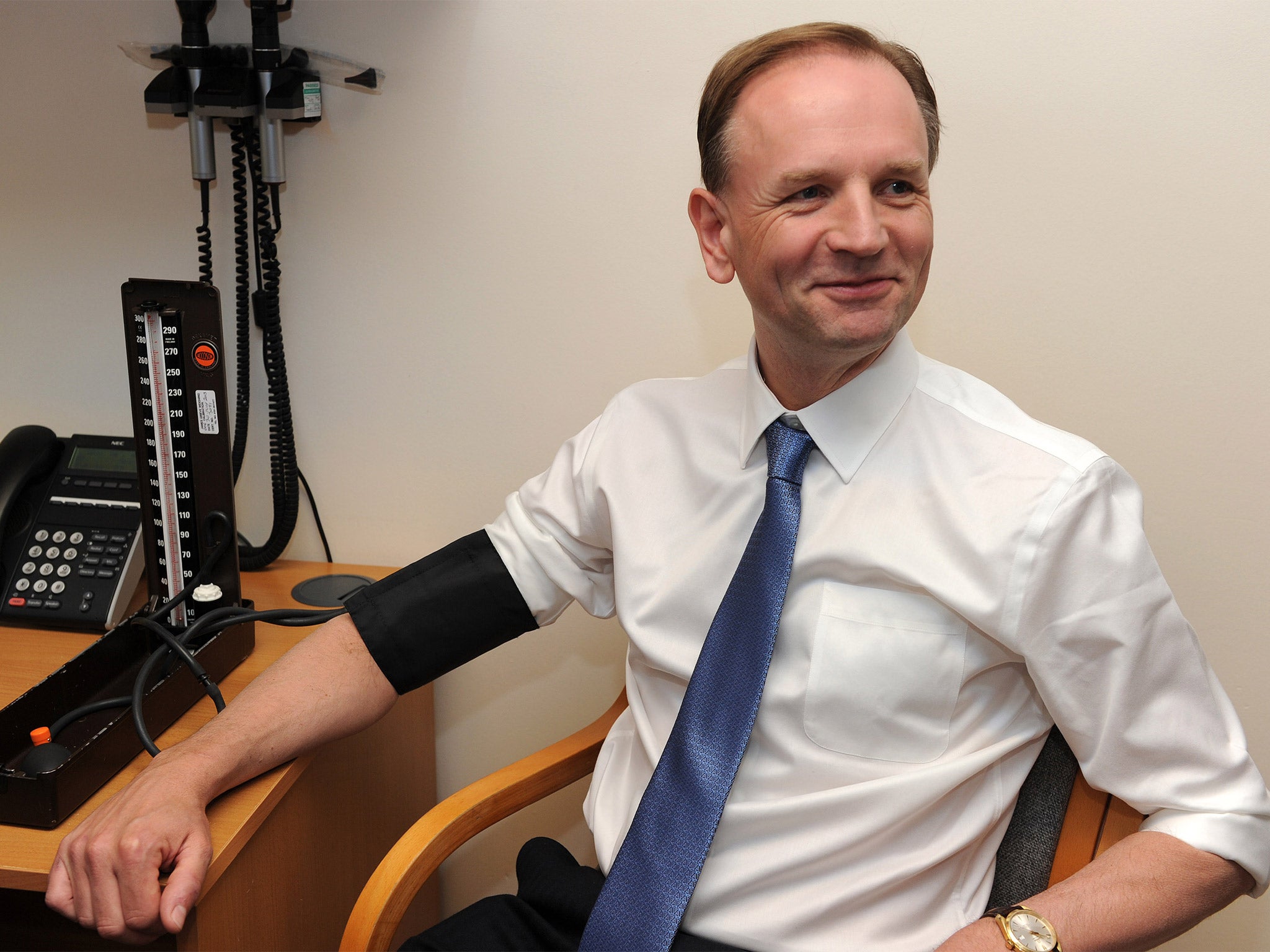To improve the NHS, it must stop being a political issue
Our NHS is stuck in 20th century, but new boss Simon Stevens may have what it takes to make it modern


Your support helps us to tell the story
From reproductive rights to climate change to Big Tech, The Independent is on the ground when the story is developing. Whether it's investigating the financials of Elon Musk's pro-Trump PAC or producing our latest documentary, 'The A Word', which shines a light on the American women fighting for reproductive rights, we know how important it is to parse out the facts from the messaging.
At such a critical moment in US history, we need reporters on the ground. Your donation allows us to keep sending journalists to speak to both sides of the story.
The Independent is trusted by Americans across the entire political spectrum. And unlike many other quality news outlets, we choose not to lock Americans out of our reporting and analysis with paywalls. We believe quality journalism should be available to everyone, paid for by those who can afford it.
Your support makes all the difference.NHS Forward View, a five-year plan for the health service in England, had been so heavily trailed before its publication yesterday that most of its likely opponents had got in their hostile salvos first.
What was left was some gentle surprise that the (relatively) new NHS England boss, Simon Stevens, had called not just for streamlining, but also for more money (£8bn, to be precise), and that the mostly “bottom-up” changes being proposed resembled the insurance-based US healthcare system far less than many had feared, given that Stevens’ previous job was in the US, as executive vice-president of a private health provider. That he was once a Labour councillor and health adviser to Labour ministers tends to be passed over.
I just wish that the health system in England could stop being a political issue and start being a matter purely of effectiveness, efficiency and high professional standards.
I wish, too, that when mistakes were made, they would not immediately be blamed on a shortage of money and that human fallibility might sometimes be acknowledged, too.
And I wish that we could wake up one morning and find the gobbledegook that has contaminated the NHS as much as it has other specialist areas had been stripped away to leave proper English that we could all understand.
None of this guff about how we are sorry if you felt we let you down, which means, essentially, it’s all your fault and not ours.
Such wishes, I fear, may be delusional, not least because the myths are so enduring.
In this respect, the Opening Ceremony to the London 2012 Olympics did no one any favours.
The chorus of appreciation for the NHS sequences was touching. But I have to admit that I did not join in.
It seemed to me then that the idealised picture of benevolent nurses (kitted out as of old, note) and happy children bouncing on their beds, only reinforced a national nostalgia that keeps the health service locked into the mental age of its late 1940s origins.
Of course, there is a generation that remembers a time when families could not afford to call out the doctor for a desperately ill child, or when you were operated on only if you had the money.
And everyone with those memories is rightly grateful for the contrast between then and now. That Britain was a pioneer of a national health service, free at the point of need or use, however, does not mean that it is still an international leader.
Other countries have looked at the NHS, learned from it and, dare I say, in some areas improved on it.
As with the steel industry or the London Underground, there are disadvantages to being in the vanguard of anything. The NHS was built on the sort of social solidarity – all in it togetherness – that exists less and less today.
Treatment and drugs may be state of the art, but even the newest hospitals and GP surgeries are stuck in the mid-20th century so far as such basics as personal privacy and standards of accommodation, such as bathrooms and food, are concerned.
And don’t mention the doctors who are still dictating letters to their assistants as though computers and email did not exist.
If nostalgia is the sin at one end of the spectrum, the lionisation of all things American is at the other.
That might sound surprising, given the popular suspicion that attended Stevens’ appointment, because of his association with the US.
If you go, as I sometimes do, to discussions about the future of healthcare in Britain, you will know that the positive comparisons are invariably with the US – where costs are vastly higher and where up to 40 million people have no health insurance at any one time – and not with, say, France, Germany or Sweden.
There are many reasons why this might be so: from the accessibility of US scientific papers because of our shared language, to the greater openness of health debate in the US, to transatlantic trips generously funded by US pharmaceutical companies.
More on the NHS: The NHS needs to 'adapt and survive
NHS to reward people for losing weigh
GPs to receive bonus for diagnosing dementia
The – mostly – scholarly comparisons, however, allow those currently accusing the Government of wanting to privatise “our NHS” to indulge in scaremongering about US-style commercialism being imposed over here.
If you look at France, say, there really is no reason why ambulances should not be privatised, or many home services for elderly or disabled people. The point is not who provides the service, but that it meets the required standard.
And what is wrong with paying a bit extra for a hotel-style room – as in Germany – while retaining access to NHS treatment? That is only socially divisive if you invoke the canon of the 1950s.
The outline of the five-year plan presented yesterday suggests that, far from being a liability, there may be an upside to Stevens’ experience of the United States.
He knows, in a way most Britons do not, what can – but mostly cannot – be transferred to a European-style national health service. Let’s see what he can do.
Soros should stick to making money and helping people

George Soros is a giant of our times. The causes to which he has donated his wealth can only be applauded.
Across East and Central Europe, but not only there, more than one generation now owes him a huge debt for helping to found, or restore, their democracies. History will surely judge him kindly.
But even the greatest men can suffer lapses, and Soros has not been immune to the occasional misjudgement.
We can, maybe, forgive his profitable speculation at our expense, when the UK was forced out of the European Exchange Rate Mechanism.
But some incautious words at the height of the euro crisis made things worse than they needed to be.
An individual with his money and clout has the power, as he well knows, to move markets.
I would put his latest remarks, in The New York Review of Books, into a similar category of irresponsible unwisdom. Europe, he says, “is facing a challenge from Russia to its very existence”.
Oh yes? Precisely how does an unproductive and disorganised country like Russia present a threat to the EU’s very existence?
If this is just, as it might appear, an appeal for massive aid – including his? – to Ukraine, that is one thing.
If it is also, as it appears to be, a call to arms, that is quite another. It is possible that such a call simply betrays a lingering Hungarian world view of Cold War vintage.
At the same time, though, it is just the sort of alarmist talk that scares Russia and parts of Europe into acting foolishly.
George Soros should stick to the money-making and the philanthropy.
He has changed some of the world in a good way. It would be unfortunate if, as a result of such loose talk, all that were undone.
Join our commenting forum
Join thought-provoking conversations, follow other Independent readers and see their replies
Comments